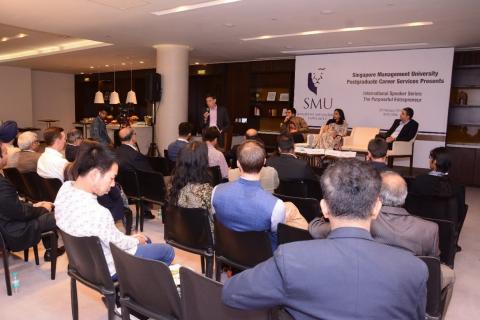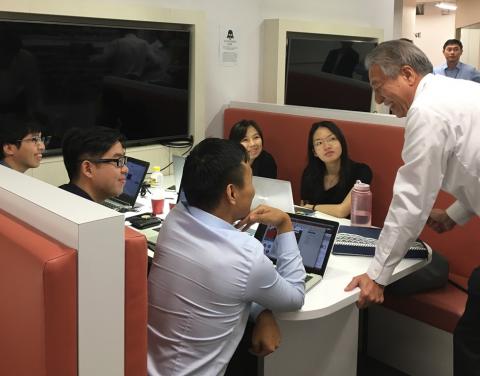The Singapore Management University (SMU) Postgraduate Career Services team launched the inaugural International Speaker Series Dialogue in February 2018, providing a platform for greater business-academic interactions and experience-sharing across geographies.
With promising talent today opting to join start-ups rather than to advance their careers in multinational firms, SMU hosted a session themed “Winning the War for Talent” on 26 February 2018 in Mumbai, India. Attended by more than fifty participants comprising entrepreneurs, members of the business community, government officials and SMU alumni, the Dialogue addressed questions of how corporates and start-ups could win over the right talent to achieve their business goals, and how corporates could increase their attractiveness to high potentials.
Speakers at the evening event included entrepreneur Mr Alan Rosling; Mr Rajeev Dubey, Group President (HR & Corporate Services), Mahindra & Mahindra; Mr Alfian Sharifuddin, MD, Head of Technology & Operations, DBS India; Mr Kausshal Dugarr, Founder and CEO of Teabox; and Dr Flocy Joseph, Programme Director at SMU Executive Development.
Mr Ajit Singh, Consul-General of the Republic of Singapore, shared that it is now a necessity for companies of all sizes, to compete for talent, and educational institutions such as SMU give companies access to a pipeline of such talent. Mr Alan Rosling, author of “Boom Country? The New Wave of Indian Enterprise”, shared in his keynote address the stark statistics showing the challenges faced by corporate India in attracting and retaining talent. Staff attrition in India, according to Hay Group, is one of the highest in major markets, at 26.7%. PwC in a recent report highlighted that 63% of CEOs have identified finding the right talent as a critical challenge facing corporates. With start-ups now seen as a viable and attractive option for talent, it is no wonder that 93% of domestic and international companies think that a new approach to people management is needed.
What can corporates then do, and learn from start-ups, in attracting and retaining talent? Mahindra & Mahindra worked on linking roles to higher purpose orders of the company, and empowering employees in a bid to unlock the full potential of each hire. DBS Bank has worked on creating a 22,000-person start-up culture, to compete with the drive of start-ups and encourage innovation from within. The hiring process of the bank has also been redesigned: for example, when hiring technical staff, it is no longer about hiring bankers first, but about competing for talent against technology companies such as Google, Facebook, etc. In cognisance of this, DBS India has created a 200,000 square-foot facility in Hyderabad which has rest areas and conference spaces, with no meeting rooms or offices, to rival that of technology set-ups. That’s not to say start-ups have it all easy – experienced staff are lured by bigger pay packets from other start-ups and also from corporates.
Do local India companies fare better than foreign companies, in terms of attracting and retaining talent? There was no consensus from the panel speakers and the audience, based on anecdotal stories shared during the evening. While some argued that local companies are better in offering camaraderie and shared purpose of existence, others felt that foreign companies have done equally well in retaining especially senior leaders. Most agree, though, that corporates would do well to provide start-up like environment, by breaking down hierarchies and creating cultures that trust and reward staff, in order to compete with start-ups. Companies also need to be more innovative in connecting to the hearts of talent. Use of analytics to recruit right and pay accordingly, would also help in identifying hires that share the same purpose with their employers. Last but not least, corporates could benefit from diversifying the pool of talent they recruit from.
In this war for talent, there is as yet no obvious winner. One thing is clear though – companies that do not rethink how it treats people, will be left out of this race altogether.
Are entrepreneurs born or made?
In a second instalment of the International Speaker Series Dialogue hosted by SMU on 28 February 2018 in Delhi, India, the topic of “The Purposeful Entrepreneur” was tackled. More than forty participants comprising entrepreneurs, members of the business community, educators and SMU alumni gathered to listen to entrepreneur Mr Alan Rosling; Mr Sunil Puri, Asia-Pacific Director – Research, innovation & Product Development at Centre for Creative Leadership; Dr. Ritesh Malik, CEO of Innov8.Work; and Dr Flocy Joseph.
The promise of “being able to make a difference”, career development and flexibility, has seen talent choosing the entrepreneurship and start-up paths over traditional and “boring” albeit stable jobs with established companies. Is entrepreneurship the rose it’s made out to be? Just what does it take to be an entrepreneur? Are entrepreneurs born, or can one chart a path towards entrepreneurship?
In his keynote address, Mr Alan Rosling highlighted the fact that there are today significantly more entrepreneurs in India compared to a decade ago. The factors fuelling this development include: availability of technology or know-how central to innovation; the ease of doing business as a result of deregulation; the availability of funding to budding entrepreneurs via venture and private equity funds; and the cultural shift towards the acceptance of entrepreneurship as a viable form of earning a livelihood. Mr Rosling singled out personal grit and networking skills as must-have qualities for successful entrepreneurs, along with the ability to take failures and bounce back from setbacks.

To further encourage entrepreneurship, the panellists called for a strengthening of the research linkage between universities and industries. It was agreed that one of the reasons for the current disconnect stemmed from industries not funding university research. There was also general consensus that society’s attitude towards failure need to change - with close to 90% of new businesses failing within its first five years, failure needs to be taken as a necessary input to success. A show of hands from the entrepreneurs in the room revealed that most omitted any mention of failed ventures in their curriculum vitae, until a successful venture crystallises. Only then are past failures celebrated and disclosed.
On the topic of talent management, panellists agreed that attributes such as propensity for risk-taking, persistence in pursuing goals and articulating visionary ideas, are innate and shaped more by “nature”. As for “nurture”, there are tools to help aspiring entrepreneurs learn acquire knowledge of business strategy and leadership.
Concluding on what large companies could do to manage the challenges posed by entrepreneurship, the panellists highlighted two divergent strategies deployed: certain companies protect their businesses by buying out their competitors while others embrace entrepreneurship. The latter involved encouraging the spirit of risk taking with rewards and creating policies to engender a culture of risk taking.

The Series is organised by SMU Postgraduate Career Services as a platform to convene thought leaders to deliver insights on relevant and real-world issues, while providing opportunities for networking and the sharing of knowledge and ideas.
[Featured photo: (from left); Mr Alfian Sharifuddin MD, Head of Technology & Operations, DBS India; Dr Flocy Joseph, Programme Director at SMU Executive Development; Mr Ajit Singh, Consul-General of the Republic of Singapore; Mr Alan Rosling, entrepreneur and author; Mr Kausshal Dugarr, Founder/CEO of TeaBox; Mr Rajeev Dubey, Group President (HR & Corporate Services) & CEO (After-Market Sector) at Mahindra & Mahindra; Ms Lynette Goh, Senior Manager & Mr Henry Yeo, Head of SMU’s Postgraduate Career Services office.]